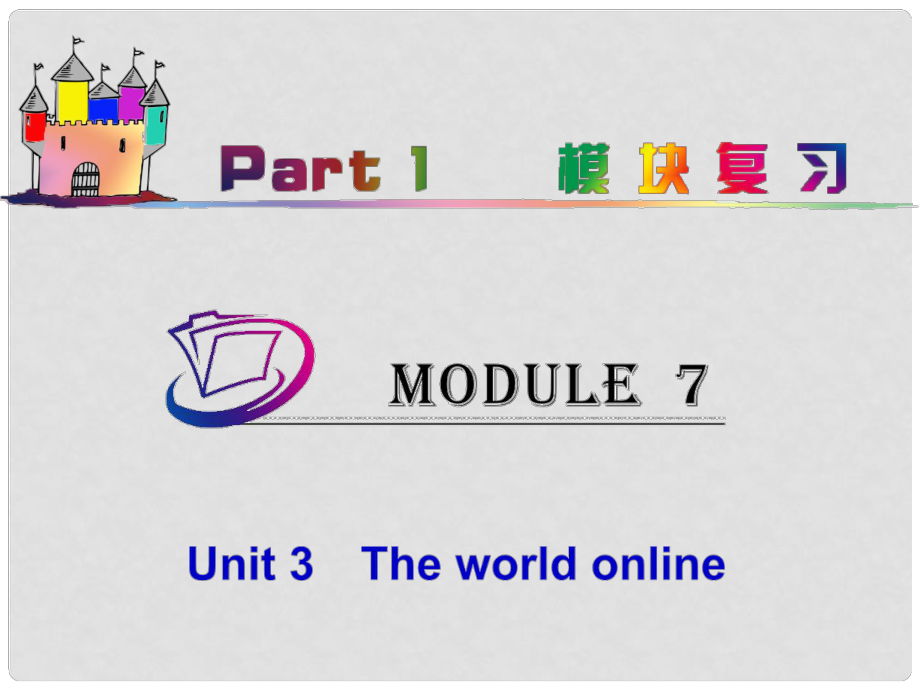《高中英語(yǔ)總復(fù)習(xí) part1 M7Unit 3 The world online(1)課件 牛津譯林版 新課標(biāo)》由會(huì)員分享����,可在線閱讀,更多相關(guān)《高中英語(yǔ)總復(fù)習(xí) part1 M7Unit 3 The world online(1)課件 牛津譯林版 新課標(biāo)(34頁(yè)珍藏版)》請(qǐng)?jiān)谘b配圖網(wǎng)上搜索�。
1、【1】 value n. 價(jià)值�����,益處 vt. 估價(jià),評(píng)價(jià)��;重視 good value 口(錢(qián))花得值�����,值得買(mǎi)of no/great value 沒(méi)有/很有價(jià)值的put/set little value on/upon 對(duì)評(píng)價(jià)不高�;不怎么重視Your help has been of great value ( very valuable)你的幫助很有價(jià)值。He valued the car at $3000.他估計(jì)這車值3000美元���。I value our friendship very much.我非常珍惜我們的友誼�。valuable adj. 有價(jià)值的���,值錢(qián)的He bought me a
2�、valuable diamond ring as a birthday present.他給我買(mǎi)了一只貴重的鉆戒作生日禮物�����。 _ regular exercise should not be underestimated.經(jīng)常鍛煉的好處不應(yīng)低估�����。The arrival of canals was _ to many industries.運(yùn)河的出現(xiàn)對(duì)許多行業(yè)具有重大的意義�����。I really _ a friend.我真的把他視為好朋友。The value ofof great valuevalue him as【2】 moreover adv. 而且�����,此外 The composition is
3�����、not well written, and moreover, there are many spelling mistakes in it.這篇作文寫(xiě)得不好���,而且�,還有許多拼寫(xiě)錯(cuò)誤���。You cant attend the party tonight because it is stormy. _, you still havent got over your high fever.(2010山東東營(yíng)一中高三一檢)A. Therefore B. HoweverC. Moreover D. OtherwiseCmoreover 此外�,表遞進(jìn); therefore表因果���; however表轉(zhuǎn)折���;o
4�、therwise 否則���,要不然的話���。【3】 consult v. 請(qǐng)教����,咨詢,查閱consult (with) sb. about/on sth. 與某人磋商某事I need to consult with my colleagues on the proposals.我需要和我的同事商討這些建議�。consult a doctor 看醫(yī)生Have you consulted your doctor about your illness?你找你的醫(yī)生看過(guò)病了嗎?consultant n顧問(wèn)���,專家consult, look up表示“查材料”時(shí)���, consult后接“字典、書(shū)籍”等��,而look u
5����、p則接查詢的“字、詞以及相應(yīng)的直接對(duì)象”�����。Look up the word in the dictionary.在字典中查詞。He consulted the manual.他查閱了使用說(shuō)明書(shū)�。If your pain continues, _.如果疼痛持續(xù)不消退,要請(qǐng)醫(yī)生診治��。You shouldnt have done it without _.你不應(yīng)該不和我商量就做了這件事����。 consult your doctorconsulting me【4】 acquire v得到,購(gòu)得��;掌握���,獲得(知識(shí)���、技能等),贏得(名聲) She has mastered English grammar an
6�、d acquired a large vocabulary without the help of a teacher.她在沒(méi)有老師指導(dǎo)的情況下����,掌握了英語(yǔ)語(yǔ)法,學(xué)到了大量詞匯�����。She acquired a reputation for dishonesty.她蒙上了不誠(chéng)實(shí)的名聲。The man has acquired much information but has little real knowledge.此人得到很多信息��,但沒(méi)有多少真正的學(xué)問(wèn)�����。acquisition n. 獲得�,取得acquire, require, inquire(1)acquire由于能力、努力或行為而獲得���、得到
7�����、或?qū)W到��。We must work hard to acquire a good knowledge of English.我們必須用功學(xué)習(xí)才能精通英語(yǔ)����。(2)require表示某項(xiàng)指定的任務(wù)所需要的東西���。The floor requires washing. 地板該洗了����。(3)inquire通過(guò)提問(wèn)題打聽(tīng)信息。The director inquired of me about/concerning our work.廠長(zhǎng)向我了解了我們工作的情況�����。Mr. Smith gradually _ a knowledge of the subject by constant study.A. inqui
8�、red B. neededC. required D. acquiredThe resources on geography can be _ in the State Library.A. acquired B. requiredC. inquired D. requestedD句意:史密斯先生通過(guò)不斷學(xué)習(xí)逐漸獲得這方面的知識(shí)。用acquire表示“獲得”��。Aacquire 得到����,獲得;學(xué)得(知識(shí)等)����,求得;養(yǎng)成(習(xí)慣等)���;require 需要���;要求�;命令���;inquire 打聽(tīng),詢問(wèn)��;request 請(qǐng)求�,要求。由句意可知��,A項(xiàng)符合題意�。【5】 handlevt. 觸���,摸�;處理���;對(duì)待�����;買(mǎi)賣(mài)�����,
9����、經(jīng)營(yíng)Do not handle goods on display.請(qǐng)勿觸摸陳列商品。Wash your hands before handling food.拿食物前請(qǐng)洗手�。We should think twice before handling a problem.我們?cè)谔幚韱?wèn)題上要謹(jǐn)慎。vi. (容易���、不易等)操縱��,此時(shí)主動(dòng)形式往往含有被動(dòng)意義This car handles well, even on wet roads.這輛汽車很好駕駛�����,即使是在濕的路面上也是如此�。The troops handled well.部隊(duì)軍紀(jì)很好�����。n. 把手��,柄�;把柄;口實(shí)�����;可乘之機(jī)I turned th
10、e handle and opened the door.我轉(zhuǎn)動(dòng)把手打開(kāi)了門(mén)��。Dont let your conduct give any handle for gossip.不要讓你的行為成為流言飛語(yǔ)的話柄�����。As nobody here knows what is wrong with the computer, we must send for a technician to _ the problem.A. handle B. raiseC. face D. presentA語(yǔ)境表示必須派人去請(qǐng)一位技術(shù)師來(lái)“處理�、解決”這個(gè)問(wèn)題���,用handle表示“處理�、對(duì)待”���。其他動(dòng)詞的含義不符合語(yǔ)境
11�、:raise提出���;face面對(duì)���;present呈現(xiàn),描述���,介紹�����?!?】 accustomed adj.習(xí)慣的;通常的���;適應(yīng)了的be/get accustomed to (doing) sth.習(xí)慣于Youll soon get accustomed to the life here.你會(huì)很快習(xí)慣這兒的生活���。I am not accustomed to walking long distances.我不習(xí)慣于長(zhǎng)距離的步行?�!癰e形容詞介詞名詞/動(dòng)名詞”結(jié)構(gòu):be fond of 喜愛(ài)����,愛(ài)好be afraid of 害怕be successful in 在方面成功be capable of 能夠b
12、e tired of 厭煩be interested in 對(duì)感興趣be quick at 在快捷be good at 擅長(zhǎng)be particular about 對(duì)挑剔be familiar with 熟悉be late for 遲到be suitable for 對(duì)合適be full of 充滿be surprised at 對(duì)感到驚奇be angry with 對(duì)生氣be responsible for 負(fù)責(zé)be expert at 專于�����,精通be fit for 勝任�,合適 They are quiet, arent they? Yes. They are accustomed _ a
13、t meals.A. to talk B. to not talkC. to talking D. to not talkingDbe accustomed to習(xí)慣于����;后面通常用動(dòng)詞的ing形式作賓語(yǔ)���;從應(yīng)答者的話中可以看出他們很安靜的原因是他們吃飯時(shí)不習(xí)慣講話?����!?】 affair n. 事���,事情,事件�����,公共事務(wù)The newspapers exaggerated the whole affair wildly.報(bào)紙毫無(wú)根據(jù)地夸大了整個(gè)事件�����。world/international/business affairs 世界/國(guó)際/商業(yè)事務(wù)affair, accident, incident,
14�、event, thing, matter, businessaccident 指意外事故,強(qiáng)調(diào)偶然性�����。One in seven accidents is caused by sleepy drivers.每7次交通事故就有1次是疲勞駕駛造成的。incident 指小事件�,政黨、政治事件�,事變。There was a shooting incident near here last night.昨夜這附近發(fā)生了槍擊事件���。The election was the main event of this year.這次選舉是今年的主要大事���。thing 指事件的通稱,無(wú)論大小事�、好壞事,但不指專門(mén)事務(wù)����。
15、A terrible thing happened last night.昨天夜里發(fā)生了一件可怕的事�����。matter 事情����、問(wèn)題。指需要考慮和處理的事情���。Learning to drive is all a matter of coordination.學(xué)開(kāi)車主要是靠協(xié)調(diào)�����。affair復(fù)數(shù)表事務(wù)�����,單數(shù)表事情���。business 公事�����,商業(yè)事務(wù),職責(zé)�����,需要處理的事情�����,強(qiáng)調(diào)任務(wù)�,職務(wù)��。Its the business of the police to protect the community.警察的職責(zé)是保護(hù)社會(huì)��。He was badly hurt in the traffic _.A strange _ happened in the ceremony.One of the chief _ of 2008 was that Beijing hosted the 29th Olympic Games.Whats the _ with the machine?Its none of your _.accidentincidenteventmatterbusiness
 高中英語(yǔ)總復(fù)習(xí) part1 M7Unit 3 The world online(1)課件 牛津譯林版 新課標(biāo)
高中英語(yǔ)總復(fù)習(xí) part1 M7Unit 3 The world online(1)課件 牛津譯林版 新課標(biāo)

